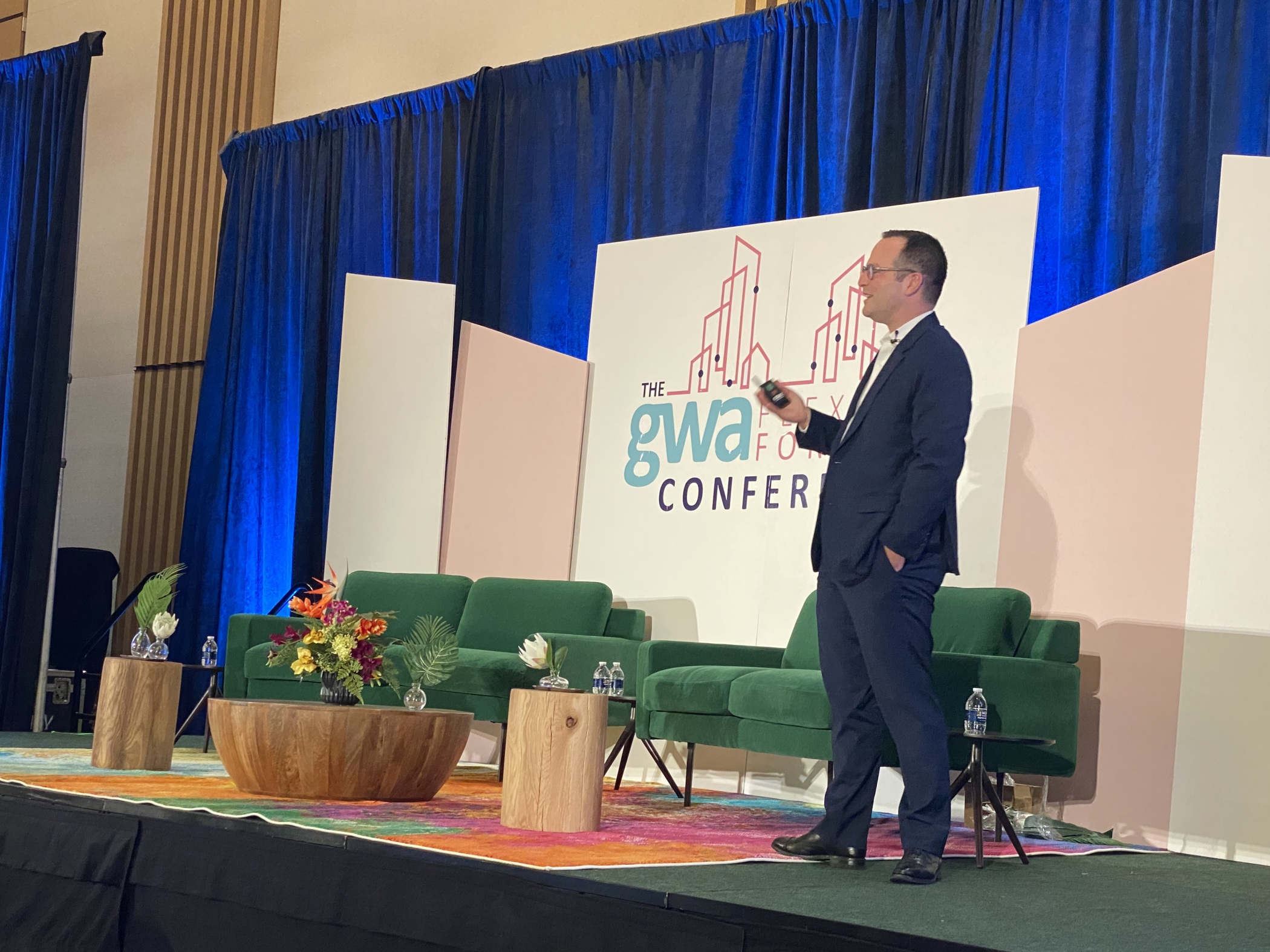Landlords, operators and others with a stake in the flexible office market are descending on greater Washington, D.C., this week to discuss all things coworking and the major shifts in national workspace demand.
The three-day conference hosted by the Global Workspace Association trade group lands as some industry professionals question the future of leasing offices by the desk and for variable lengths of time.
Workspace providers are adjusting their real estate holdings while tenants settle into permanent schedules that involve a combination of remote and in-office work. And high-profile coworking space provider WeWork looms large as it grapples with how to become profitable.

Stretching Headquarters Boundaries
The days of the singular corporate hub appear to be numbered as small startups and the nation's largest firms adjust their real estate to adapt to a workforce emerging from a pandemic.
With trends such as remote work, increased flexibility, and a sharpened focus on cost management, companies are driving demand for flexible office space in an attempt to tap into a more dispersed talent pool and make workspaces more accessible for employees, Dror Poleg, an author and speaker who studies the future of work, said Wednesday during the keynote discussion.
While large companies including Amazon, Meta and Stripe began splitting their headquarters across multiple locations well before the pandemic, Dror said the shift to a more distributed real estate structure has accelerated in recent years. Remote hires now outpace those made in the same state in which companies are based, according to data from payroll services firm ADP, with more than 60% of hires last year reported as out of state.
"Employers are driving the growing need to flexibility," Poleg said. "Companies can no longer make the type of decisions or the type of commitments they could make 10 or 20 years ago. Company boundaries are changing, and the office of the future is a network, not a place."

Willing Takers
WeWork is scrambling to renegotiate its leases in an attempt to offload what interim CEO David Tolley recently described as "unfit and underperforming locations.” For other flexible workspace brands across the industry, however, they see those unwanted locations as an appealing opportunity.
With nearly 800 WeWork locations around the world under the financial microscope, smaller competitors including boutique flexible space provider Mindspace are looking at WeWork's real estate portfolio and preparing to take over any potential offloaded leases in an effort to expand their own portfolios. Those abandoned leases would mean lower finish-out expenses because the space is already mostly built out, Mindspace U.S. General Manager Shai Fogel told CoStar News. That lowers the entry barriers to markets that would otherwise be far more expensive to break into, he said.
Asked if his company is keeping a close eye on any potential leases WeWork decides to terminate, Fogel said: "Absolutely." He adds that "nothing is certain yet, but many of those locations have already been proven and wouldn't require much to build out. A lot of them would be a good fit for us."

Going Global
As remote work takes on a permanent role in the global economy, flexible workspace providers are looking beyond their traditional U.S. boundaries to accommodate the rising demand for international locations.
For Convene, the New York-based flexible workspace provider that emphasizes its hospitality approach, that means pursuing a more diverse pipeline of future locations that will expand the company's footprint to areas across not only the United States, but also Canada, the United Kingdom and the European Union.
"The research we've been doing shows that there are really great global markets that will bode well for us," Convene President Amy Pooser told CoStar News. "Some companies have shed real estate, have reduced their real estate or have gone completely to a remote-work strategy, so they need ways to continue to help keep their employees productive. Despite all the uncertainty in the world, we're using it as an opportunity to grow and improve and meet customers wherever they are."
Convene has already signed at least one other lease in the United Kingdom, Pooser said, adding to the 13 locations it already operates across London and Manchester.
Despite the focus on stretching its global reach, however, coworking operators will continue to keep an eye on markets closer to home. Convene is in the final stages of preparing for the October opening of its first location in downtown San Francisco and is also looking at options to meet rising demand in secondary office markets across the nation's Sun Belt region.
"We're opportunistic," Pooser said. "If something meets the financial bar on the terms that work for us, we'll entertain it. We have a clear growth path right now and a robust real estate pipeline and we won't rule anything out as long as it meets the overall bar."
